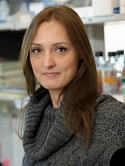Diacylglycerol kinase α establishes T cell polarity by shaping diacylglycerol accumulation at the immunological synapse Journal Article
| Authors: | Chauveau, A.; Le Floc'h, A.; Bantilan, N. S.; Koretzky, G. A.; Huse, M. |
| Article Title: | Diacylglycerol kinase α establishes T cell polarity by shaping diacylglycerol accumulation at the immunological synapse |
| Abstract: | Polarization of the T cell microtubule-organizing center (MTOC) to the immunological synapse between the T cell and an antigen-presenting cell (APC) maintains the specificity of T cell effector responses by enabling directional secretion toward the APC. The reorientation of the MTOC is guided by a sharp gradient of the second messenger diacylglycerol (DAG), which is centered at the immunological synapse. We used a single-cell photoactivation approach to demonstrate that diacylglycerol kinase α (DGK-α), which catalyzes the conversion of DAG to phosphatidic acid, determined T cell polarity by limiting the diffusion of DAG. DGK-α-deficient T cells exhibited enlarged accumulations of DAG at the immunological synapse, as well as impaired reorientation of the MTOC. In contrast, T cells lacking the related isoform DGK-ζ did not display polarization defects. We also found that DGK-α localized preferentially to the periphery of the immunological synapse, suggesting that it constrained the area over which DAG accumulated. Phosphoinositide 3-kinase activity was required for the peripheral localization pattern of DGK-α, which suggests a link between DAG and phosphatidylinositol signaling during T cell activation. These results reveal a previously unappreciated function of DGK-α and provide insight into the mechanisms that determine lymphocyte polarity. |
| Journal Title: | Science Signaling |
| Volume: | 7 |
| Issue: | 340 |
| ISSN: | 1945-0877 |
| Publisher: | American Association for the Advancement of Science |
| Date Published: | 2014-08-26 |
| Start Page: | ra82 |
| Language: | English |
| DOI: | 10.1126/scisignal.2005287 |
| PROVIDER: | scopus |
| PUBMED: | 25161317 |
| PMCID: | PMC4993625 |
| DOI/URL: | |
| Notes: | Export Date: 1 October 2014 -- Source: Scopus |
Altmetric
Citation Impact
BMJ Impact Analytics
Related MSK Work







